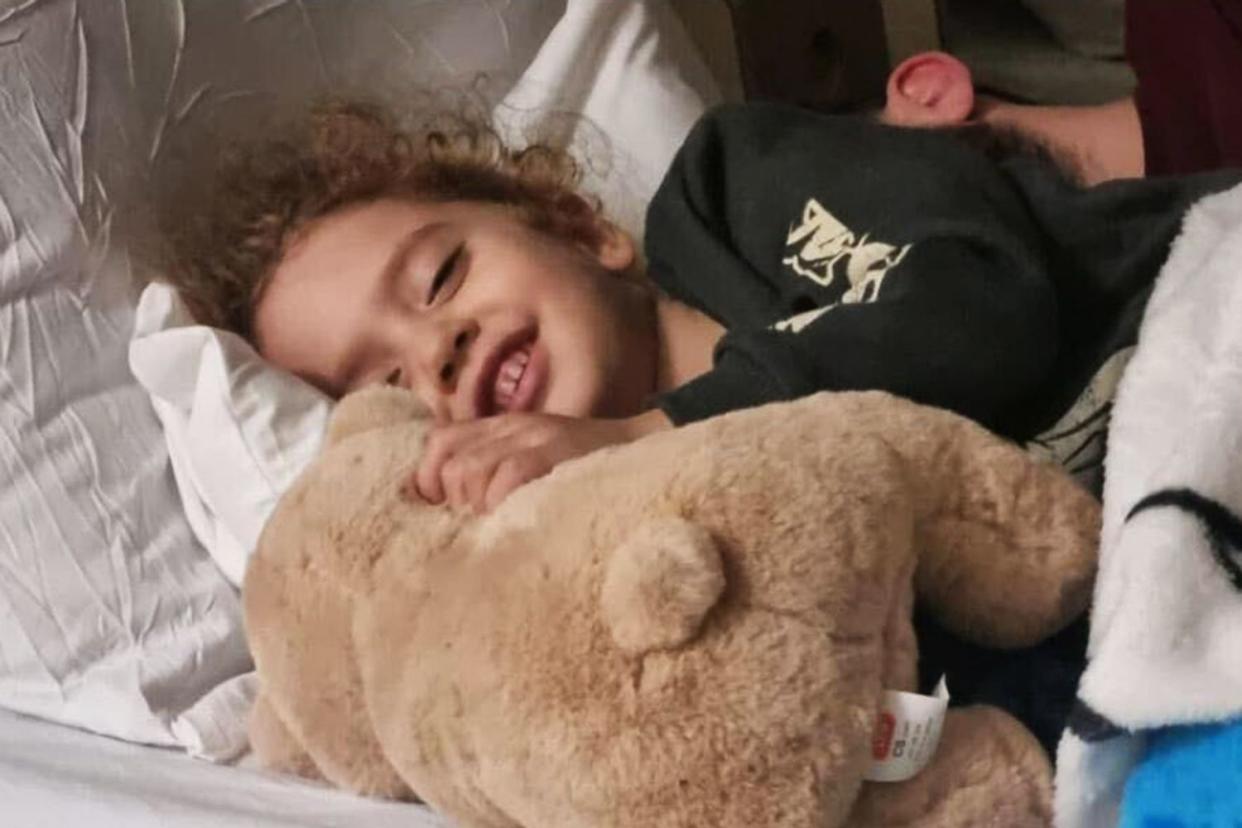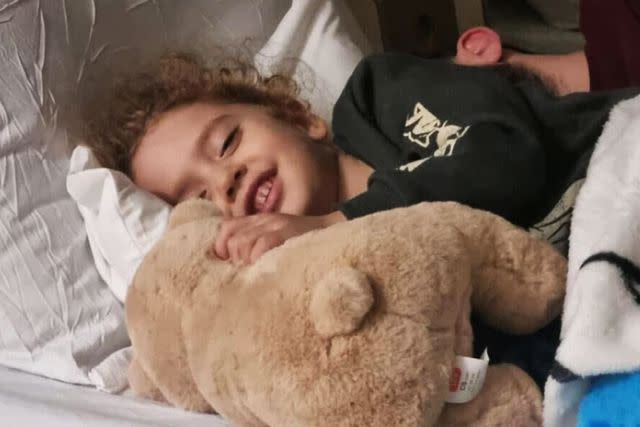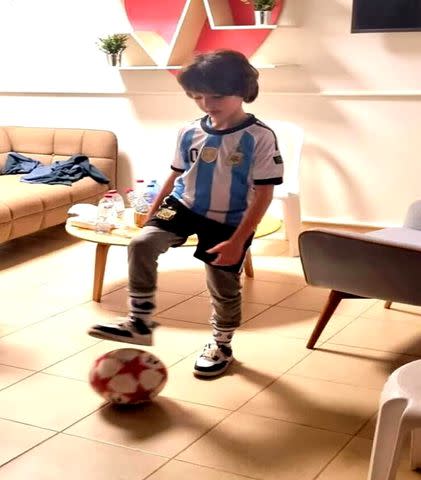Family of 6 Freed Israeli Hostages Describe 'Very Tough Moments' for Children Following 50 Days of Gaza Captivity

After the return of her family, it feels "even more urgent to get all the hostages back," Shaked Haran tells PEOPLE, "because now we know what the reality there is like"

Courtesy of the Haran Family
Yahel Shoham, 3, was released by Hamas after she was held hostage in Gaza for 50 days.On Saturday, six members of the Haran family, including three young children, were returned to Israel after being held hostage by Hamas for 50 days.
The homecoming felt "overwhelming" and like "a miracle," says Shaked Haran, 34, who was waiting at the Israeli hospital for her family, where she was finally able to embrace her mother, Shoshan Haran, 67; her sister Adi Shoham, 38, and her children Naveh, 8 and Yahel, 3; and her aunt Sharon Avigdori, 52 and her daughter Noam, 12. All six had been held hostage in Gaza after being taken from Shoshan's home in the kibbutz Be'eri on Oct. 7.
But their joy is enmeshed with wrenching grief. Adi's husband Tal, 41, remains in captivity. Shaked's father Avshalom, 66, was murdered on Oct. 7, devastating news she had to break to her mother Shoshan, who had believed he was also kidnapped. Also killed were Shaked's aunt, Lilach Kipnis, 60, and uncle Eviatar Moshe Kipnis, 65, along with Eviatar's caregiver, Paul Castelvi.

Courtesy of the Haran Family
"On the one hand, we are extremely happy to be reunited, and we really feel it's a miracle that we are together and my mother and my sister and the children are safe and well," says Shaked, who is 38 weeks pregnant with her third child. "And on the other hand, to tell them the really sad news about my father and my mother's sister and her husband — and that's only the close family. So many of my mother's friends have been murdered. And so there's a lot to tell and to sink in."
The family, who had gathered in Be'eri to celebrate the Sukkot holiday before the deadly Hamas attack, is now navigating dueling experiences of trauma. "It's so complicated because we've been in different planets for the past almost two months, and also to hear from them about what they've been through," says Shaked. "On top of all that, my brother-in-law is still there, so his children, his wife here are worried. We are all worried. So it's very mixed."
Physically, Shaked says her returned family members are healthy. "They needed some treatment in the hospital, but nothing severe. Mentally, it's a process."
As accounts emerge of a 12-year-old Israeli captive forced to watch footage of the massacre and a 9-year-old hostage who now refers to Gaza as "the box" and would only speak in whipsers upon her return, Shaked is hesitant to describe the conditions in which her family was held. But she says the women and children were together, and her mother, sister and aunt worked to distract the children from their surroundings by way of imagination games and speaking optimistically of their hopes.

Courtesy of the Haran Family
Adi Shoham, center, was kidnapped and taken hostage. She reunited with her siblings Yuval, left, and Shaked, right."They tried to make it more less heavy for them," she says. "They didn't talk about the situation in the big picture. They focused on the every moment, every day, small things, so the children didn't think about, didn't hold in their mind the big story of what's going on."
Ten Israeli children remain in Gaza, according to the Times of Israel, including a 10-month-old baby, among an estimated 175 Israelis still held hostage.
Back on Israeli soil, the young children are adjusting to a new normal. "There are very good moments in the day where they're playing and laughing and being children, but also very, very tough moments where they're experiencing stress and fear and anxiety," says Shaked.

Courtesy of the Haran Family
Naveh Shoham, 8, plays with a soccer ball after being released by Hamas.After the return of her six family members, it feels "even more urgent to get all the hostages back," says Shaked, "because now that we know what the reality there is like. Every day that passes there is less chance of bringing back these people, especially the very small children that are there, the elderly people-but also the fathers, the young men. We just feel like this situation has to be on the top priority of both Israel and of the international community."
Putting their lives back together will take time. Shoshan Haran, who was held hostage in Gaza during her husband's funeral, is "very motivated to keep the family together, to be strong for all of us, especially for my sister and the children," says her daughter. "For her, this is the mission. I think only after we finish this whole never-ending horror story, she will be able to make the time for herself. But right now she's not there."

The Haran Family
Avshalom Haran, left, was killed on Oct. 7. Shoshan Haram, right, was held hostage by Hamas for 50 days.The dislocated family is temporarily staying in central Israel. "My mother has nothing," Shaked says. "Her house was burned, all her belongings were taken. So it's putting together a life again while mourning my father, while waiting anxiously for my brother-in-law to come back."
And while Shaked had not seen the footage released by Hamas showing her aunt Sharon and cousin Noam smiling and told to "keep waving" as they stepped into a vehicle leaving Gaza, she underscores the reality at play.
"No one should be confused about the fact that it's terrorists and it's a terror attack. These people have been taken from my parents' house at gunpoint after my father has been murdered and 90 other people from the kibbutz," she says.
She continues: "Even if hostages are smiling while they're being released, it says nothing, in my opinion about the situation in whole. Maybe people want to hold on some nicer notion of what's going on, but it's just a wish to see less evil here. Kids have been released without their mothers and fathers in order to put pressure. It's obvious that the situation is not a humane situation, that the hostages are one of the crucial humanitarian crises that need to be taken care of. I don't think that something like 'a wave' can make it [go] all away."
For more People news, make sure to sign up for our newsletter!
Read the original article on People.


